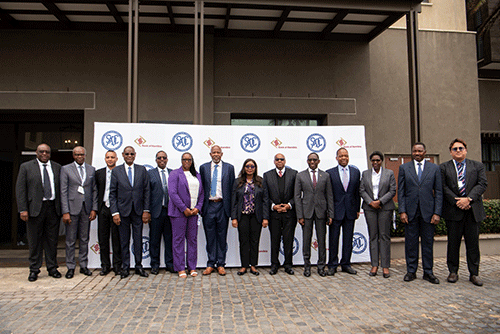SWAKOPMUND – Prime Minister Saara Kuugongelwa-Amadhila has deplored the challenging circumstances faced by the SADC region.
These include high inflation, low economic growth, and a series of natural disasters, such as droughts, floods, and climate change.
She pointed out that the El Nino phenomenon has caused food insecurity in Namibia, emphasising the need for the financial sector to develop creative techniques and models to mitigate the impact of climate-related shocks and their macroeconomic consequences.
Kuugongelwa-Amadhila ventilated this during the opening of the 57th meeting of the Southern African Development Community (SADC) Committee of Central Bank Governors (CCBG) in Swakopmund on Friday.
According to the her, inflation remains stubbornly high, primarily due to recent global developments, despite central banks’ efforts to control it and prevent it from eroding household incomes.
“As we work towards ensuring macroeconomic stability in the region, we must maintain our focus on promoting accelerated, sustainable and inclusive growth through increased investment and deeper trade. This will create much-needed jobs and reduce poverty and income inequality among our people,” Kuugongelwa-Amadhila said.
She then moved to express concern about the financial exclusion of many people, especially those in rural and informal
areas, who lack access to financial services or face unaffordable financial charges.
She urged central banks to support their governments by developing innovative, modern and secure solutions to enhance financial inclusion and cross-border payments. “I am confident that central banks
will continue to fulfill their mandates diligently and provide valuable advice to governments on various economic
aspects. Likewise, I have no doubt that governments will utilise the advice from central banks to foster inclusive and sustainable economic growth and development,” Namibia’s longest serving finance minister said.
Kuugongelwa-Amadhila was finance minister between 2003 and 2015.
She also emphasised the need for capital markets to better serve the entire population and adapt to current economic
realities.
She is an ardent believer that central banks can play a significant role in deepening and broadening the inclusiveness of capital markets, complementing government efforts in the process.
Economies around the world, she hastened to say, including many in Africa, are grappling with debt distress, largely due to external factors that have hindered development efforts and set back recent socio-economic progress on the
continent. The meeting was held under the banner ‘Sustainability in the Financial System’.
It was planned and focused on championing home-grown and context-specific responses to green financing while propelling the SADC region to be at the forefront of the sustainability agenda.
The meeting took place during a time when the region and the rest of the world are battling high inflation, high debt levels and low economic growth.
The indaba also provided an opportunity for SADC central bank governors to receive updates on the progress made with the implementation of the CCBG 2021-2023 strategy, allowing them to craft the new 2024-2026 CCBG strategy.
Addressing the convention, Bank of Namibia governor Johannes !Gawaxab acknowledged the challenges of an uncertain global economy, characterised by low growth and high inflation.
He emphasised the importance of monetary stability as the foundation of the economic order.
“Our efforts towards financial integration rely heavily on this stability, which serves as the fundamental cornerstone,” !Gawaxab said.
What is more, Global Central Bank Forum chairperson, Sabine Mauderer also stated that climate change is negatively affecting the role of central banks.
As such, there is a need for the banks to include that risk in their models.
“Amidst the impact of climate change, there are chances for growth and prosperity. We need to unlock solutions, and these solutions will only be found through an open dialogue bringing climate finance demands and finance supply together if investors find the right environment,” Mauderer said.
– edeklerk@nepc.com.na



